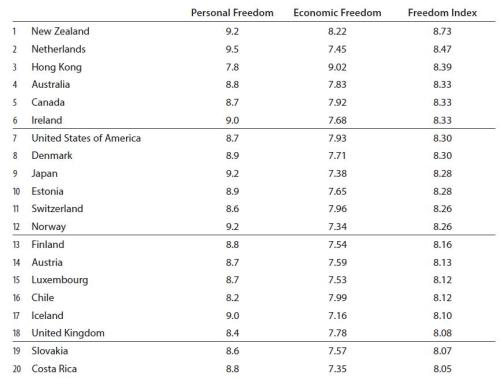I’ve always been a big fan of Economic Freedom of the World because it provides a balanced and neutral measure of which nations do best in providing free markets and small government.
And I like it even when it gives me bad news. It’s somewhat depressing, after all, to read that the United States has dropped from the #3 nation when Bill Clinton left office to the #18 country in the most recent index.
But for all its many positive attributes, Economic Freedom of the World isn’t a comprehensive measure of liberty. That’s why I’m very glad to see that Ian Vasquez and Tanja Stumberger have put together a Freedom Index designed to measure economic and personal liberty.
And since they’re both sensible people, their definition of personal liberty is very sound – i.e., the freedom to be left alone and not harassed, persecuted, or annoyed by government.
Recommended
Here’s their description of what the Freedom Index is designed to measure.
…we use indicators that are as consistent as possible with the concept of negative liberty: the absence of coercive constraint on the individual. We do not attempt to measure positive freedom…nor do we measure so-called “claim freedoms,” which often become government-imposed attempts at realizing positive freedoms (e.g., the “right” or freedom to a have job or housing). …This index of freedom also does not incorporate measures of democracy or “political freedom.” …Democracy may be more consistent than other forms of government at safeguarding freedom, but it is not freedom, nor does it necessarily guarantee freedom. …We combine economic freedom measures from the Economic Freedom of the World (EFW) index with measures of what we somewhat imprecisely call civil or personal freedoms. The economic freedom index and the personal freedom index we devise each receive half the weight in the overall index.
Here are some additional details on the personal freedom score.
For the personal freedom sub-index, we use 34 variables covering 123 countries… The index is divided into four categories: 1) Security and Safety; 2) Freedom of Movement; 3) Freedom of Expression; and 4) Relationship Freedoms. …We have tried to capture the degree to which people are free to enjoy the major civil liberties—freedom of speech, religion, and association and assembly—in each country in our survey. In addition, we include indicators of crime and violence, freedom of movement, and legal discrimination against homosexuals.
So how do nations compare with this system?
New Zealand is the nation with the most freedom, followed by the Netherlands and Hong Kong. The United States is #7
By the way, if you’re wondering about places to avoid on your next overseas vacation, Zimbabwe is in last place, followed by Burma and Pakistan.
And if you want to maximize your personal liberty, but aren’t as concerned about economic liberty, the top nations are the Netherlands (9.5), Uruguay (9.4), and Norway/Japan/New Zealand (9.2).
If you want to experiment with a life of very limited personal liberty, your “best” choices are Pakistan (3.1), Zimbabwe (3.2), Sri Lanka (3.4), and Iran (3.6).
Last but not least, here’s the video I narrated from the Center for Freedom and Prosperity that explains in more detail the economic-freedom component of the Freedom Index.
Hmmm…more growth and prosperity with free markets and small government. Such a novel concept!




